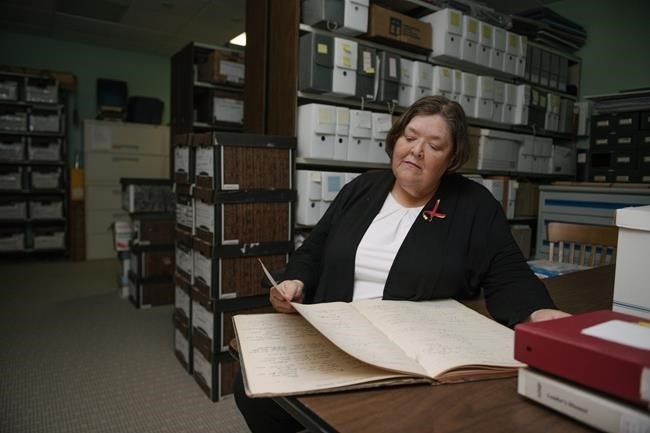
Nancy Hurn, an archivist at the Anglican Church of Canada in Toronto, pores over an old Keewatin register marking baptisms, burials, marriages and confirmations, as part of her work in attempting to help families who have lost relatives somewhere in the residential school system, Thursday, August 23, 2018.
Image Credit: THE CANADIAN PRESS/Galit Rodan
August 25, 2018 - 2:30 PM
Nellie Hardisty was just a little girl from Moose Factory in Ontario when she disappeared into the morass of Indian residential schools and associated hospitals.
She died of turberculosis at the age of 12. None of her family ever saw her again or even knew where the smiling child with the deep dimples had been buried.
Decades later, her nephew Logan Jeffries finally held her picture. There they were, those dimples.
"I got a little emotional," he says.
"My whole family, my children, my grandchildren, all share those dimples. That's where it came from. That lady there. My mom always talked about those."
Jeffries spent 12 years looking for his Aunt Nellie. It wasn't until Aboriginal researchers teamed up with Nancy Hurn, an archivist at the Anglican Church of Canada, that someone placed a file in his hands.
"I've been an Anglican my entire life," says Hurn, who has made these posthumous reunions her special task.
"The church has lots to account for. I feel my role is living out our apology."
The Truth and Reconciliation Commission says the fate of at least 4,300 children who attended residential schools is unknown.
Hurn's involvement goes back 15 years to when Canada began dealing with the legacy of those institutions. The church's national archives hold the records of its missionary society, which ran the Anglican schools until they were turned over to the federal government in the 1960s.
As churches and the federal government moved toward a settlement and lawsuits mounted, Ottawa needed the names of all students who had attended the schools.
The Truth and Reconciliation Commission, formed in 2008, asked for complete records as well. Eventually, hundreds of thousands of records from the Anglican archives — including minutes of meetings, parish records, newsletters and notes from women's auxiliary groups and chapel registers — were transferred.
"As we did that, we realized that there were a lot of students who were identified as having died in the schools," Hurn says.
Her job took on a new aspect.
"I was getting requests from a few people about students who never came home and they didn't know what happened to them."
The commission is compiling a database of all missing children. It expects to have it done by next March.
"Even then, I can say for sure we won't be putting out a definitive list of names," says commission archivist Raymond Frogner. "It's a monumental task."
The requests to Hurn haven't stopped.
About half a dozen people a year turn to her to find out how their relatives died and where they are buried. Those requests became a personal mission.
"This has to be done," says Hurn. "It's so important."
She recalls one woman from Sudbury, Ont., asking if she could find out what happened to her brother.
"I said, 'We're going to find John.' And then I thought, what am I saying? I have no idea.
"Then I found the records and they had a funeral for him and all the kids turned out and they made a wreath. They sang the hymns. The family was so grateful."
That's been Hurn's experience — "the people's graciousness and the understanding and the acceptance."
"There were a few who were angry at the church and they have every right to be, but mostly they've been gracious."
Nothing can make up for the past, says Hurn, who is days away from retirement. But she's glad she was able to do what she could.
"At least I could make a contribution to help them feel like they could heal."
It's important to know what happened, says Jeffries.
"I feel good in my heart that I found my aunt."
Jeffries plans to visit her grave. Put up a cross. Place a few flowers.
"It's closure," he says.
— Follow Bob Weber at @row1960 on Twitter
News from © The Canadian Press, 2018